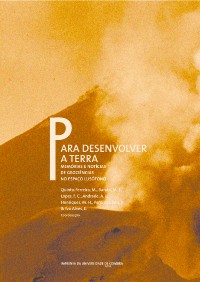Please use this identifier to cite or link to this item:
https://hdl.handle.net/10316.2/31477| DC Field | Value | Language |
|---|---|---|
| dc.contributor.author | Rocha, P. C. | |
| dc.contributor.author | Andrade, L. F. | |
| dc.date.accessioned | 2014-06-23T09:11:04Z | |
| dc.date.accessioned | 2020-09-18T17:20:14Z | - |
| dc.date.available | 2014-06-23T09:11:04Z | |
| dc.date.available | 2020-09-18T17:20:14Z | - |
| dc.date.issued | 2012 | - |
| dc.identifier.isbn | 978-989-26-0531-9 (PDF) | |
| dc.identifier.uri | https://hdl.handle.net/10316.2/31477 | - |
| dc.description.abstract | The generality of the mineral processing techniques are ancient and they are based on different properties of minerals to separate. Plastics are the third most important component of municipal solid waste (MSW), contributing about 10% of its weight and about 20% of its volume. Although plastics are widely used, because of its excellent properties, they are bad to recycle because they are difficult to separate from each other. In this work jigging and froth flotation separation of three bi‑component plastics mixtures (PS/PMMA, PS/PET and PS/PVC) is compared. The effect of the particle sizes was studied in five grain‑size fractions. The quality of the separation by jigging and by froth flotation varies with the plastic mixture and depends on particle size. For a PS/PMMA mixture, the quality of the separation by the two processes improves with particle size. Grain‑size fractions lower than 2.8 mm have better results by jigging separation than by froth flotation. In the coarser fractions the two processes led to separations with the same quality. PS/PET mixture presents the worst results of the three mixtures. The two processes led to similar separations. The influence of particle size in the two separation processes was not noticeable, because of the effects of PET particles shape. In the PS/PVC mixture the froth flotation presents better results than the jigging process. This mixture presented also the best results. The jigging separation improves with particle size. Jigging and froth flotation have proved to be reliable methods for the separation of plastics. | eng |
| dc.description.abstract | A generalidade dos processos de beneficiação de minérios é antiga, baseia‑se nas propriedades dos minerais a separar e têm permitido beneficiar todo o tipo de minérios. Os plásticos constituem o terceiro constituinte mais importante dos resíduos sólidos urbanos (RSU), contribuindo com cerca de 10% do seu peso e cerca de 20% do seu volume. Embora os plásticos sejam largamente utilizados, consequência das suas excelentes propriedades, eles são maus de reciclar porque são difíceis de separar entre si. Neste trabalho compara‑se a separação por jigagem e por flutuação por espumas de três misturas de plásticos (PS/PMMA, PS/PET e PS/PVC), contribuindo cada um com 50%, e analisa‑se a influência do calibre e forma das partículas. Para a mistura PS/PMMA a qualidade da separação melhora com o aumento do calibre das partículas nos dois processos. Para os lotes inferiores a 2,8 mm a jigagem permitiu obter melhores resultados que a flutuação, mas para as frações grosseiras os dois processos conduziram a separações com qualidade semelhante. A mistura PS/PET apresenta os piores resultados e ambos os processos conduziram a qualidades semelhantes, não sendo evidente a influência do calibre, como consequência do efeito da forma lamelar das partículas de PET. Para a mistura PS/PVC a flutuação por espumas apresenta melhores resultados do que a jigagem. A qualidade de separação melhora com o aumento do calibre das partículas. A jigagem e a flutuação por espumas têm potencialidades para poderem ser utilizados como métodos de separação de plásticos. | por |
| dc.language.iso | por | - |
| dc.publisher | Imprensa da Universidade de Coimbra | por |
| dc.relation.ispartof | http://hdl.handle.net/10316.2/24404 | por |
| dc.rights | open access | - |
| dc.subject | Plastics | eng |
| dc.subject | Jigging | eng |
| dc.subject | Froth flotation | eng |
| dc.subject | Particle size | eng |
| dc.subject | Plásticos | por |
| dc.subject | Jigagem | por |
| dc.subject | Flutuação por espumas | por |
| dc.subject | Calibre das partículas | por |
| dc.title | Aplicação de tecnologia mineira na separação de plásticos para reciclagem | por |
| dc.title.alternative | Mineral processing techniques in the separation of plastic for recycling | eng |
| dc.type | bookPart | por |
| uc.publication.firstPage | 359 | - |
| uc.publication.lastPage | 368 | - |
| uc.publication.location | Coimbra | por |
| dc.identifier.doi | 10.14195/978-989-26-0531-9_36 | - |
| uc.publication.digCollection | PB | por |
| uc.publication.orderno | 37 | - |
| uc.publication.area | Ciências Naturais | por |
| uc.publication.bookTitle | Para desenvolver a Terra: memórias e notícias de Geociências no espaço lusófono | - |
| uc.publication.manifest | https://dl.uc.pt/json/iiif/10316.2/31477/218936/manifest?manifest=/json/iiif/10316.2/31477/218936/manifest | - |
| uc.publication.thumbnail | https://dl.uc.pt/retrieve/11297837 | - |
| uc.publication.parentItemId | 52112 | - |
| uc.itemId | 71928 | - |
| item.grantfulltext | open | - |
| item.fulltext | With Fulltext | - |
| Appears in Collections: | Para desenvolver a Terra: memórias e notícias de Geociências no espaço lusófono | |
Files in This Item:
| File | Description | Size | Format | |
|---|---|---|---|---|
| 36-para_desenvolver_a_terra_artigo..pdf | 1.2 MB | Adobe PDF |  |
Items in DSpace are protected by copyright, with all rights reserved, unless otherwise indicated.
